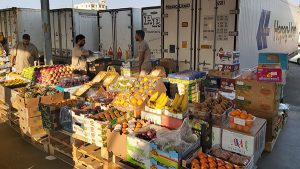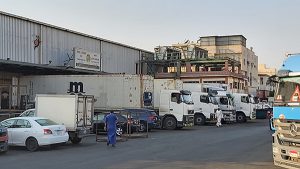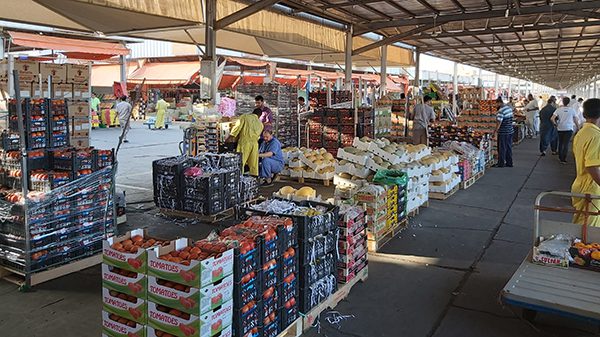With a population of some 33 million, Saudi Arabia is the largest of the Gulf States and whilst Riyadh, the capital, is the administrative centre of the country, Jeddah, with a cosmopolitan population of 4 million, is known as the commercial hub.
Its location on the Red Sea Coast sees it act as the main conduit in the country for imported produce.
This comes from the likes of South Africa, Chile, Central America, the United States, European countries such as Holland, France and Italy in particular, and New Zealand.
 These imports include bananas, apples, citrus, stone fruits, grapes and some exotics and high-quality vegetables. U.S. produce is normally targeted at high end retailers, restaurants and hotels. China and Indian supplies dominate the market for products such as garlic and onions. The Philippines is a key supplier of bananas.
These imports include bananas, apples, citrus, stone fruits, grapes and some exotics and high-quality vegetables. U.S. produce is normally targeted at high end retailers, restaurants and hotels. China and Indian supplies dominate the market for products such as garlic and onions. The Philippines is a key supplier of bananas.
Produce imports from the U.S., Southern Hemisphere and Asia are supplemented by arrivals from the so called MENA countries (Middle East & North Africa) – Turkey, Egypt, Jordan, Lebanon and Syria (in the past). These normally come by truck and sometimes by sea freight.
 All this makes Jeddah a veritable melting pot of buying and selling of produce from around the world. It creates a highly competitive market environment where everything comes down to a subtle combination of price and quality.
All this makes Jeddah a veritable melting pot of buying and selling of produce from around the world. It creates a highly competitive market environment where everything comes down to a subtle combination of price and quality.
Imports are dominated by the so-called Cold Store companies – the best known of these is Sharbatly.
This business was formed over 60 years ago and now has 12 branches across the whole Kingdom and three branches in Dubai, Bahrain and Egypt.
They have a seriously impressive infrastructure in terms of cold stores, ripening facilities and distribution, with a customer base made up of the leading retailers, hotels and restaurant chains.
Much of the produce in Jeddah finds its way to the central wholesale market – the Halaga -this literally means “the auction” in Arabic. Here there is a myriad of activity from conventional wholesaling, small scale retailing as well as daily auctions.
All the leading supermarkets have buying operations based at the Halaga to coordinate supplies, but produce often physically bypasses the actual market facility. Deals are done on a direct basis with suppliers.
 The market, physically situated in the city centre, is now choked with traffic; having been originally built in the 1970s it is beginning to show its age. There are poor produce handling facilities and very limited cool storage in high temperatures of up to 40 degrees Celsius (100 F).
The market, physically situated in the city centre, is now choked with traffic; having been originally built in the 1970s it is beginning to show its age. There are poor produce handling facilities and very limited cool storage in high temperatures of up to 40 degrees Celsius (100 F).
There are now ambitious plans to relocate the market facility to an out of city location – as part of a huge regeneration programme of which the wholesale market will be just a part.
The retail sector is dominated by Panda which is the largest food retailer in the Middle East. Panda is owned by the Savola Group and has more than 400 branches of Panda Super, Panda Hyper and Pandati in Saudi Arabia and Egypt.
Carrefour from France is the leading international retailer operating in Saudi. There is a booming hotel and restaurant sector in Jeddah, not least as a result of the government policy of making Saudi Arabia a more open economy in the future – both economically and socially – under its Vision 2030 Programme.
With an increasing population, predicted to rise to some 40 million by 2030, and a young demographic – over 25% of the population is under the age of 20 – demand for food and fresh produce is expected to increase significantly over the next 10 years.
Success in this part of the world is in some ways no different from others. Selection of the right partner is critical. Understanding the market per se, consumer and customer behaviour – why wouldn’t you do that?
Having a good grasp of the overall political and key social drivers for change is essential. Knowing who you are competing against and what the size of the price is should be a given.
But hey – Saudi Arabia – why not?



